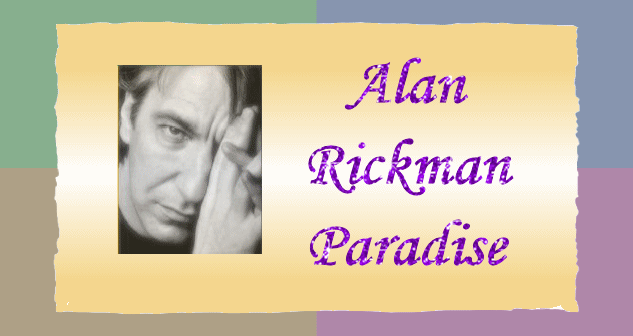

Accueil Home
| THE MAN |
| Biography |
| Contact |
| ARTISTIC CAREER |
| Movies |
| Theater |
| Television |
| Others |
| Awards |
| MULTIMEDIA |
| Photos |
| Videos |
| Fan arts |
| Interviews / Press |
| Links |
| THE WEBSITE |
| Forum |
| Guestbook |
| Credits & contact |
Interview of the "Time out Chicago" (13/12/07) :
Question : Were you familiar with
Sweeney Todd when you started this project? Had you seen it?
Alan Rickman : Actually I had seen it two years ago on Broadway.
Question : That was considered a landmark
production. Did it influence your interpretation, or did you just try to get it
out of your mind?
Alan Rickman :
The difference in the theater is it’s very much about the
singing. When you see Patti LuPone playing Mrs. Lovett, you’re kind of pinned to
your seat by the force of her presence onstage. But on film you have to have
something completely other. They’re totally different events.
Question : Was it a hard adjustment for you
as a screen actor to burst out in song?
Alan Rickman :
I think one of the great things about the movie is the way
the music grows naturally out of the speech. Because it’s Stephen Sondheim, the
lyrics are absolutely as important as the music, so you’re constantly thinking,
What am I saying?, not What notes am I singing?
Question : You had musical training at the
beginning of your career. Was that something you kept up or was this a fresh
return to singing?
Alan Rickman :
Well, yes, singing was certainly part of my training at
drama school [at the Royal Academy of Dramatic Art, which Rickman attended in
the ’70s], but nothing for years. Strangely enough, I had gone to a singing
teacher 18 months ago and started having some singing lessons because I thought
it’d be helpful with speaking. I don’t know if I was psychic or something. And
then I had to stop for a long period because I was working, but at least it
meant there was a singing teacher who I could ring up and start working with
again. And indeed I have continued working with him after finishing the film
because it’s so valuable in every area.
Question : I understand Sondheim was there
during parts of the recording process. That’s a little unnerving.
Alan Rickman :
He wasn’t there for mine, thank God.
Question : You recorded the songs in advance,
right? So you had to develop the character there, and then come back later and
match your interpretation in the acting.
Alan Rickman :
It’s a bit odd. You kind of think we can land on the moon,
so why on this are we still in primeval times? But on the other hand, the last
thing you want to be doing is singing live all day for eight hours. Also, they
can’t adjust the different volumes unless you record separately.
Question : And you actually recorded
separately from Johnny Depp on your big duet, “Pretty Women”?
Alan Rickman :
You have to be practical about these things. But yes,
Johnny and I recorded it separately, so that’s really weird. We never sang
together until we were on the set lip-synching.
Question : Some people know you as that guy
from Die Hard; to others, you’re Severus Snape from the
Harry Potter films. Is that strange, being seen so differently by
different generations?
Alan Rickman : Older people say, “Oh I loved you in Sense and
Sensibility,” and that’s the only film they want to talk about. Equally,
there are people who only want to talk about Galaxy Quest. And
there’s a whole bunch of teenagers who only want to talk about Dogma.
Question : Are you much of a fan of movie
musicals in general?
Alan Rickman :
Well, not particularly. But I’m a great fan of Fred
Astaire. Because he was a real artist and his artistry is the other side of real
discipline. I have a photograph at home of Fred Astaire from the knees down with
his feet crossed. It’s kind of inspiring because it reminds me his feet were
bleeding at the end of rehearsals. Yet when you watch him, all you see is
freedom. It’s a reminder of what the job is about in general, not just being in
musicals. He honored the medium of film, didn’t he?
Hank Sartin